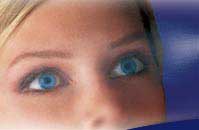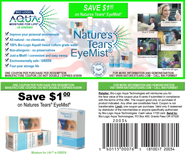
Lasik Eye Surgeon Marguerite McDonald, on Eye Care
The Latest on Eye Care, Sight Preservation and Dry Eye
Guest: Dr. Marguerite McDonald (New York, NY), Ophthalmologist, refractive eye surgeon and LASIK pioneer.
This is a paraphrased summary of an interview on the Sharon Kleyne Hour - Power of Water Internet radio talk show on World Talk Radio, Apple iTunes and Green Talk Network. Sharon Kleyne is an internationally recognized entrepreneur, water and health advocate, and Founder of Bio-Logic Aqua Research and Save a Child's Life Foundation. To hear the complete show, go to www.SharonKleyneHour.com
Sharon Kleyne: Dr. Marguerite McDonald is a refractive eye surgeon and Clinical Professor of Ophthalmology at New York University. Dr. McDonald, how did you become interested in eyes?
Dr. Marguerite McDonald: I was severely visually impaired as a child and never saw my mother's entire face until I was five. From that day on, I was fascinated by eyes. Years later, as an ophthalmologist, I became interested in refractive surgery as a way to permanently repair vision. I participated in the development of laser eye surgery and performed the very first laser eye surgery, in New Orleans, in 1987.
S: What was wrong with your eyes?
M: I was extremely nearsighted. To see something clearly, I had to get within an inch so I rarely saw the whole object. However, I was also extremely bright so I could compensate. My parents never knew about my eye problem until I was five.
S: How did they find out?
M: I was in a shopping mall and fell into a pool that I didn't see and nearly drowned. My parents were dumbfounded that I hadn't seen the pool. That's when I finally got glasses.
S: I've always felt that eyes are the most important organ in relating to the outside world. And yet there is far less education available on eye care than most other health areas.
M: Studies show that Americans know virtually nothing about eye care and sight preservation. That's why I support the American Academy of Ophthalmology's "EyeSmart" campaign. The Academy recommends a dilated eye exam at age 40 no matter how good your vision is.
S: What should a parent with a new baby look for regarding eye care?
M: Better hospitals routinely test infant vision. All babies should have an eye exam because with conditions such as lazy eye, pediatric cataract (one birth in 50) or glaucoma, the earlier they are caught, the easier they are to correct
S: Could you talk about eyes and the brain?
M: Technically, the retina is part of the brain. Eye-to-brain pathways begin developing immediately after birth and it is critical that the baby's eyes send correct messages.
S: Do infants ever have dry eye symptoms?
M: Rarely. And it is difficult to detect. However, pediatric medications for asthma and coughs are dehydrating and can cause dry eye. In adults, of course, it is estimated that 40,000,000 people suffer from serious, chronic dry eye.
S: What do you recommend for school children with eye complaints?
M: Schools can detect poor eyesight because all you need is an eye chart. Diseases such as dry eye or glaucoma are harder to detect.
S: Have you encountered computer vision syndrome or computer dry eye in your practice?
M: Frequently. When you work at a computer, your blink rate can drop from 30 to 40 times a minute to as low as three, resulting in dry eye symptoms.
S: What do you recommend for computer vision syndrome?
M: Move the desk chair up or the computer down so there is a 15-20 degree angle between the eye and the screen, with the screen lower. That way, eyelids are partially closed when viewing the screen. Also, take a break every 45 minutes and look at far objects. Artificial tears and a natural eye mist can be a big help.
S: Are there other eye related occupational health hazards?
M: Dry eye can greatly affect night driving. Vision drops and the risk of accident is greater.
S: Could you review the symptoms of dry eye?
M: Red eyes, fluctuating blurred vision that improves when you blink, slight itching, drowsiness, and a need to press down on your eyelids. Excessive tearing can also be a symptom. Eyes usually feel OK in the morning but as they lose water during the day, tiny ulcerations develop on the cornea, which causes reflex tearing. Reflex tears protect eyes from infection and improves eyesight but it is far better if your regular tear film does this.
S: What about nutrition and eye health?
M: Natural dark green leafy vegetables, dark fruits such as blueberries, cold water fish and flaxseed oil are all excellent for eye health. As a bonus, they are also all rich in antioxidants.
S: What is the latest in refractive surgery?
M: Laser eye surgery is now in its 20th year and LASIK has evolved into "All-Laser LASIK," which is simpler and safer. The procedure improves night vision and usually makes your vision better without glasses than it was with glasses.
S: Good eyesight is crucial to US troops so the procedure could save lives.
M: Definitely. There have also been exciting sight preservation advances in interocular lens implants, that improve both far and near vision. The new lenses, which go by a number of names (such as "Re-Zoom"), decrease the need for reading glasses by 90%. They are in focus at all distances and under all lighting conditions. They are often implanted during cataract surgery. You can also go in for a LASIK "touch-up" if your vision still isn't perfect.
CONTACT:
Bio-Logic Aqua Research - Rogue Media Division.1-800-FOR-MIST (367-6478)
RogueMedia@biologicaquaresearch.com
www.sharonkleynehour.com
whatistheeye.wordpress.com
www.biologicqua.com









